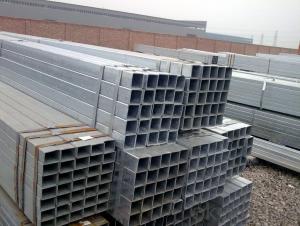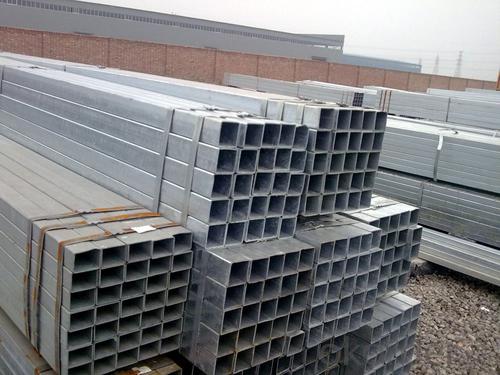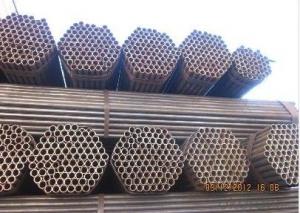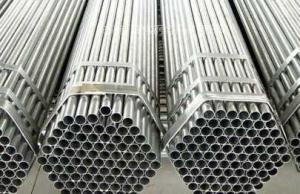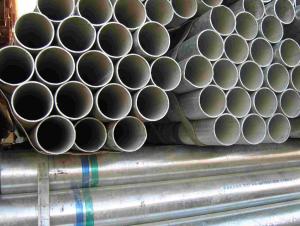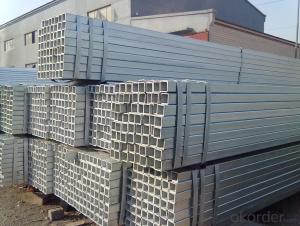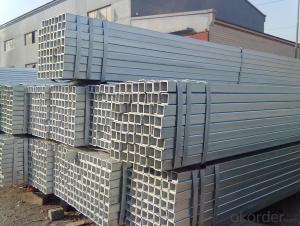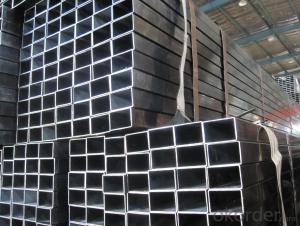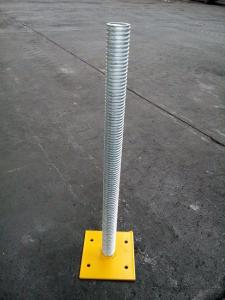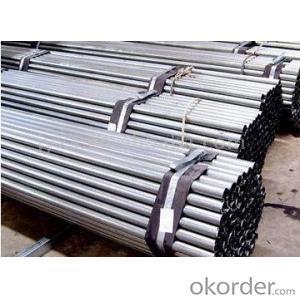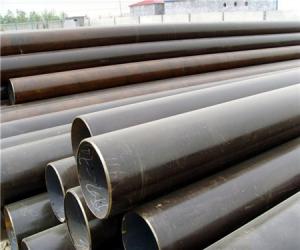Galvanized Rectangular hollow section/ RHS
- Loading Port:
- Tianjin
- Payment Terms:
- TT OR LC
- Min Order Qty:
- 10 m.t.
- Supply Capability:
- 5000 m.t./month
OKorder Service Pledge
OKorder Financial Service
You Might Also Like
Product Name | rectangular hollow section/ RHS | |
Size | Size: | 10*10--500*500mm |
Thickness: | 0.45--16mm | |
Length: | 3-12m | |
Steel Grade | Q195,Q215,Q235,Q345,16Mn, 20# | |
Standard | ASTM A500,EN10219,GB/T6728,GB/T6725,JIS G3466 | |
Usage | 1. For Structure, Airport, Railway 2. Construction and so on. | |
Ends | Plain end or By Your Choice | |
Surface | Bared Or With Oiled Or Galvanized | |
Technique | ERW ,Hot Rolled and Cold Rolled | |
Section Shape | Rectangular | |
Inspection | With Hydraulic Testing, Eddy Current , Infrared Test | |
Package | Bags, Bundle, In Bulk, Containers | |
MOQ | 20 Metric Ton / Can Be Negotiated | |
Supply Ability | 15,000 Metric Ton/Month | |
Date of Delivery | 7 days(Qty within 1000 Metric Ton) or According To The Quantity | |
Port of Shipment | Tianjin, China | |
Payment | L/C T/T | |
- Q: What are the different types of supports used for steel pipes in buildings?
- Steel pipes in buildings commonly utilize various types of supports. These supports serve different purposes and are typically made of metal or plastic materials. Firstly, pipe hangers are designed to bear the weight of the pipe. They are securely attached to the building structure and prevent the pipe from sagging or shifting. Pipe clamps, on the other hand, are employed to fasten the pipe to a wall or other structural element. These clamps consist of a metal band that encircles the pipe and is then fixed to the structure using bolts or screws. Their main function is to provide stability and prevent any movement or vibration of the pipe. For distributing the weight evenly and offering additional support, pipe shoes are installed beneath the pipe. These support devices are typically made of metal or rubber and can be attached to the building structure or embedded in concrete foundations. To guide the movement of the pipe and prevent excessive bending or shifting, pipe guides are utilized. These guides, usually composed of metal or plastic, are installed at regular intervals along the length of the pipe. Lastly, pipe rollers are employed to support horizontal pipes and permit expansion and contraction due to temperature changes. Made of metal, these rollers allow the pipe to move freely without causing any harm to the building structure. It is crucial to select the appropriate type of support based on the specific requirements of the steel pipe and the building structure. By properly supporting steel pipes in buildings, their stability, durability, and overall safety are ensured.
- Q: What is the dimensional stability of steel pipes?
- The ability of steel pipes to retain their shape and dimensions in different conditions and external forces is referred to as dimensional stability. Steel pipes are well-known for their exceptional dimensional stability due to the inherent properties of the material. Steel, being a strong and rigid material, can maintain its shape even when subjected to high pressure or temperature fluctuations. This characteristic makes steel pipes highly suitable for applications that demand stability and resistance to deformation, such as plumbing, oil and gas pipelines, and structural supports. In addition to its inherent strength, the dimensional stability of steel pipes is also a result of their manufacturing processes. These pipes are typically produced using methods like seamless or welded construction, ensuring uniformity and consistent dimensions throughout the pipe's length. This precise manufacturing contributes to the dimensional stability of steel pipes. Furthermore, steel pipes are often coated with various protective coatings to increase their resistance to environmental factors. These coatings, such as galvanization or epoxy coatings, not only provide corrosion protection but also enhance the dimensional stability of the pipes by adding an extra layer of strength and durability. In conclusion, the widespread use of steel pipes in different industries is largely attributed to their dimensional stability. Their ability to maintain their shape and dimensions, even in challenging conditions, guarantees reliable and long-lasting performance in various applications.
- Q: How do you transport steel pipes safely?
- Transporting steel pipes safely requires proper planning, equipment, and adherence to safety measures. Here are some guidelines to ensure the safe transportation of steel pipes: 1. Choose appropriate transportation equipment: Use a flatbed trailer or a truck with a flatbed to transport steel pipes. Ensure that the trailer or truck has a strong and secure tie-down system to prevent the pipes from shifting during transit. 2. Secure the pipes: Use nylon or steel straps to secure the steel pipes to the trailer or truck bed. Make sure the straps are tightened properly, evenly distributing the weight of the pipes and preventing any movement or shifting. 3. Protect the pipes: Use pipe chocks or padding materials such as foam or rubber to prevent the pipes from rolling or rubbing against each other during transportation. This helps to minimize potential damage and maintain the integrity of the pipes. 4. Observe weight limits: Ensure that the weight of the steel pipes being transported does not exceed the load capacity of the transportation equipment. Overloading can lead to instability and compromise safety. 5. Follow road safety regulations: Adhere to all local traffic laws and regulations, including speed limits and securing all necessary permits or licenses for oversized loads if required. Additionally, use hazard warning signs or flags when transporting long or oversized steel pipes to alert other road users. 6. Conduct regular inspections: Before starting the journey, inspect the straps, tie-downs, and other securing mechanisms to ensure they are in good condition. Regularly check the load during transit to ensure it remains secure. 7. Plan the route: Choose a route that is suitable for the size and weight of the steel pipes being transported. Avoid roads with low bridges, narrow lanes, or weight restrictions that may pose a risk to the safe transportation of the pipes. 8. Consider weather conditions: Take into account weather conditions, such as strong winds or heavy rain, which can affect the stability of the load. Adjust the transport plan accordingly or delay the journey if necessary. 9. Train and educate drivers: Ensure that the drivers responsible for transporting steel pipes are well-trained and aware of the proper procedures for securing and transporting the load safely. Regularly update them on safety protocols and any changes in regulations. By following these guidelines, you can transport steel pipes safely, minimizing the risk of accidents, damage to the pipes, and ensuring the safety of everyone involved in the transportation process.
- Q: What is the single length of galvanized steel pipe?
- Hot dip galvanized steel pipe is widely used in fire, power and highway.
- Q: What are the different types of steel pipe supports for high-temperature applications?
- There are several types of steel pipe supports designed specifically for high-temperature applications. Some common ones include rigid supports, such as rigid hangers and clamps, which provide strong support and prevent pipe movement. Expansion joints are also used to accommodate thermal expansion and contraction in the pipes. Additionally, spring supports and constant supports are employed to absorb vertical movement and maintain a consistent pipe elevation.
- Q: What is the role of steel pipes in HVAC systems?
- Steel pipes play a crucial role in HVAC systems as they are used to transport hot or cold water, steam, and refrigerant gases throughout the system. They provide a durable and reliable conduit for the flow of fluids, ensuring efficient heating, cooling, and ventilation in buildings. Additionally, steel pipes are resistant to corrosion and can withstand high pressure, making them ideal for HVAC applications.
- Q: What are the different types of steel pipe end connections?
- There are several types of steel pipe end connections, including threaded, socket weld, butt weld, flanged, and grooved connections.
- Q: Can steel pipes handle extreme weather conditions?
- Yes, steel pipes are known for their ability to handle extreme weather conditions. Steel is a durable and strong material that can withstand harsh environmental elements, including extreme temperatures, high winds, heavy rainfall, and even extreme weather events like hurricanes and tornadoes. Steel pipes are commonly used in various industries and applications, such as water and sewage systems, oil and gas pipelines, and construction projects, precisely because of their resilience and ability to withstand extreme weather conditions. Additionally, steel pipes can be coated or treated to enhance their resistance to corrosion, further increasing their ability to handle extreme weather conditions.
- Q: What are the different types of steel pipe supports for seismic applications?
- There are several types of steel pipe supports commonly used for seismic applications, including sway braces, rigid braces, snubbers, and restraints. Sway braces are designed to absorb lateral movement and provide flexibility during seismic events. Rigid braces, on the other hand, offer rigid support and resist movement. Snubbers are used to dampen pipe vibrations and prevent excessive movement. Restraints are used to anchor and limit the movement of the pipe during seismic activity.
- Q: How do steel pipes perform in seismic zones?
- Steel pipes perform well in seismic zones due to their high strength and ductility. They have the ability to absorb and distribute seismic energy, which helps in reducing the impact of earthquakes. Additionally, steel pipes are resistant to damage and deformation during seismic events, making them a reliable choice for infrastructure in earthquake-prone areas.
Send your message to us
Galvanized Rectangular hollow section/ RHS
- Loading Port:
- Tianjin
- Payment Terms:
- TT OR LC
- Min Order Qty:
- 10 m.t.
- Supply Capability:
- 5000 m.t./month
OKorder Service Pledge
OKorder Financial Service
Similar products
Hot products
Hot Searches
Related keywords
